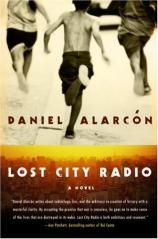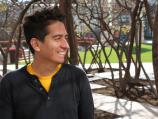Lost City Radio
Review
Lost City Radio
In a world riven by sectarian violence and stalked by ethnic
tension and the conflict it spawns, it's all too tempting simply to
turn away from stark images of terrorist bombings or to flick the
remote control to revel in the story of the latest celebrity
embarrassment. In his quietly haunting first novel, LOST CITY
RADIO, Peruvian-born American writer and author of the
widely-praised short story collection WAR BY CANDLELIGHT, Daniel
Alarcón, forces us to confront the inhumanity of these
conflicts and the toll they exact on both participants and
bystanders.
LOST CITY RADIO is set in an unnamed South American country a
decade after the government has crushed the 10-year-long rebellion
of a group of insurgents dubbed the "Illegitimate Legion." The
war's inciting grievance, if there was one, was soon forgotten and
yet the battles raged on, devastating urban neighborhoods and
depopulating the towns and villages that dot the countryside. Rey,
one of the novel's main characters, muses that the war "would have
happened anyway. It was unavoidable. It's a way of life in a
country like ours."
Rey is an "ethobotanist committed to the preservation of
disappearing plant species." Near the end of the conflict he
vanishes in the vicinity of a jungle village renamed "1797," as
part of a government program to eradicate vestiges of local history
by replacing traditional place names with numbers. Each Sunday
night his widow, Norma, hosts a wildly popular program entitled
"Lost City Radio" on the government-owned radio station during
which she fields calls from people looking for missing family
members, many of them victims of the political violence and others
simply erased from the lives of their loved ones by the country's
advancing urbanization. Her voice, "gold that stank of empathy," in
the words of her station manager Elmer, snakes out over the city
and the program sometimes results in reunions that become occasions
for popular celebrations. In all the years she's hosted the show,
Norma has never abandoned hope that someday it will serve as the
vehicle for a reunion with Rey.
Norma's life as the "mother to an imaginary nation of missing
people" is disrupted irretrievably when a young boy named Victor, a
refugee from 1797 whose mother recently has drowned, appears at the
station clutching a list of the disappeared compiled by his fellow
villagers. Even more unsettling to Norma than the fact that Victor
comes from the remote village where Rey was last seen is the
appearance on the list of an assumed name under which her late
husband carried out clandestine political activities. Despite a
seemingly happy marriage to Rey, Norma knew little of these
activities and even less of what her husband did on his frequent
trips, ostensibly for scientific research, into the jungle.
Slowly and seductively, Alarcón peels away the layers of Rey's
double life. The night he and Norma meet he's imprisoned and
tortured at a prison called the "Moon." A year later, they reunite
and soon are married. Eventually, Rey is recruited by a man in a
rumpled suit to act as a secret courier, but the novel hints at a
much deeper involvement in terrorist activities, something that
creates an unbridgeable distance between him and Norma.
Childless herself, Norma becomes by default Victor's parent. Elijah
Manau, Victor's teacher and his mother's lover, who accompanies the
boy to the city and initially abandons him, rejoins Norma and
Victor and the three unite in an odyssey across the urban
landscape. Norma learns a secret about Rey even more stunning than
any revelation of his political activities.
Like radio dial flickering between distant stations, LOST CITY
RADIO moves seamlessly from Norma's life in the postwar capital
city, to her relationship with Rey, and on to glimpses of life in
1797, separated from the capital not merely by distance, but by a
vast cultural gulf. Though the scenes it depicts give the novel a
distinctly Latin American atmosphere, Alarcon himself, in a 2005
interview in the San Francisco Chronicle, acknowledged,
"if I were Pakistani or Kenyan, I could probably be writing a
similar novel." He's acutely aware of the novel's universal themes:
"What does a car bomb say about poverty," he writes, "or the
execution of a rural mayor explain about disenfranchisement?"
Alarcón's prose is elliptical and dreamlike, aptly suited to
the mysterious spell he weaves in LOST CITY RADIO. It's a novel
that whispers, rather than shouts, for our attention, and it's all
the more powerful and moving for that fact.
Reviewed by Harvey Freedenberg on January 7, 2011
Lost City Radio
- Publication Date: February 1, 2007
- Genres: Fiction
- Hardcover: 272 pages
- Publisher: HarperCollins
- ISBN-10: 0060594799
- ISBN-13: 9780060594794





